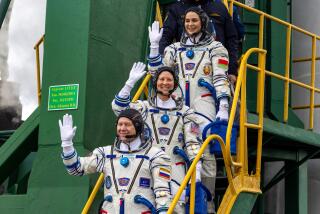Lost in Space : Cosmonauts go up and now a different world awaits them
- Share via
“We regret to report that because of ground conditions your flight has been diverted to. . . . “
The message is distressing for any traveler, but consider the plight of Soviet flight engineers Sergei Krikalev and Anatoly Artisebarsky. They have been aloft since last March in the orbiting space station Mir. In the meantime, their country, at least as they knew it, has ceased to exist.
The Russian Republic, under Boris Yeltsin, regards itself as heir apparent to the Soviet space program as well as to the Soviet nuclear arsenal. But Baikonur, the main Soviet space launching base, lies in Kazakhstan; and in August Kazakhstan nationalized all Soviet state installations on its territory. So, Kazakhstan owns Baikonur. But who owns space station Mir? And who owns the spaceships that have shuttled cosmonauts back and forth between the two?
Anatoly is due home this month, and the diversion of his flight seems to have been, for a time, an option seriously entertained. Rather than have the return of his ship become the occasion for a toe-to-toe confrontation between Russia and Kazakhstan, he was told that--surprise!--he might be dropped into the Pacific.
With the economy collapsing around them, why would either Russia or Kazakhstan want the costly luxury of a space program? Because rocketry is one product--and rocket travel one service--that the Soviet economy can still manage. The Japanese paid a $12-million first-class fare in 1990 to send Toyohiro Akiyama on the Baikonur-Mir shuttle.
Thus, when Sergei and Anatoly rather plaintively inquired whether Baikonur and Mir had been sold to a foreign buyer (“And, we are asking, together with us?”), they had reason to do so.
Last Wednesday, a new crew (including one Austrian) was sent up to relieve Anatoly. One of the relief crew--who’s from Kazakhstan, significantly--will accompany him on the return trip. Sergei has had to re-up for a tour of unannounced length, and it’s been a seven-month flight already.
The cosmonauts were originally to have returned in August, but then the boss, Mikhail Gorbachev, took a little unscheduled holiday of his own, and prudence dictated finding an extra chore to do out where you can see forever better than you can see tomorrow.
Such a chore was at hand in the form of a test sip from “the Coca-Cola space can,” designed for easy drinking even in conditions where bubbles don’t necessarily bubble up. So, if it should happen that, by the time Sergei makes it back, the Baikonur space station has found a Japanese buyer (today Hollywood, tomorrow the universe), then maybe this veteran of six space walks can make commercials for Coke. Frank Borman with a Slavic accent, and why not? Work has already begun on the space vending machine.
Throughout this voyage into political surrealism, nothing has been quite so reassuring as the public Russian reaction. “The greater theater of the absurd is breaking up into small studios,” one Moscow television announcer said, adding, as the scramble over ownership of the Space-Age assets grew more unseemly: “When the lights go out in the dining hall, the guests start to grab hamburgers from the table. The last hand in gets stabbed by a fork.” Funny, and yet a little poignant as well.
The lucky few who have seen “this fragile Earth, our island home,” from space have all been struck by the disappearance, from that wondrous vantage point, of political borders. From out there, the whole Earth is the only Earth you see. And no one who has felt the romance and the implicit hope of all can quite suppress a sigh at the thought that the internal borders of the Soviet Union, once barely visible even from down here, have started to count for so much up there.
The Soviet Union is breaking apart as the travel-weary cosmonauts orbit high above it; still, for all that, the Earth itself may be knitting together.
Safe home, brothers. Let’s hope that one day we can look back on this--on all this--and laugh.
More to Read
Sign up for Essential California
The most important California stories and recommendations in your inbox every morning.
You may occasionally receive promotional content from the Los Angeles Times.













